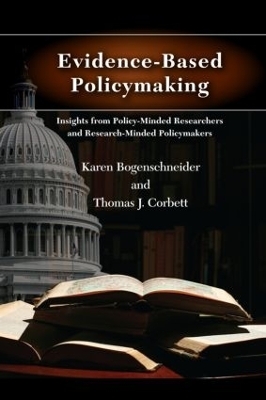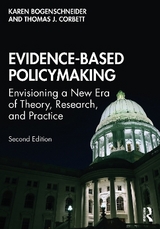
Evidence-Based Policymaking
Routledge (Verlag)
978-0-415-80584-1 (ISBN)
This book is for those who believe that good government should be based on hard evidence, and that research and policy ought to go hand-in-hand. Unfortunately, no such bond exists. Rather, there is a substantial gap, some say chasm, between the production of knowledge and its utilization. Despite much contrary evidence, the authors propose there is a way of doing public policy in a more reflective manner, and that a hunger for evidence and objectivity does exist.
The book is pragmatic, drawing on advice from some of the best and brightest informants from both the research and policy communities. In their own voices, researchers provide incisive analysis about how to bridge the research/policy divide, and policymakers provide insights about why they use research, what kind is most useful, where they seek it, and how they screen its quality. The book breaks through stereotypes about what policymakers are like, and provides an insiders’ view of how the policy process really works. Readers will learn what knowledge, skills, approaches, and attitudes are needed to take research findings from the laboratory to lawmaking bodies, and how to evaluate one’s success in doing so.
The book’s balance between theory and practice will appeal to students in graduate and upper-level undergraduate courses in family studies and family policy, educational policy, law, political science, public administration, public health, social work, and sociology. This book will also be of interest to researchers who want to bring their ideas into policy debate and to those who work with policymakers to advance an evidence-based policy agenda.
Dr. Karen Bogenschneider is a Rothermel Bascom Professor of Human Ecology at the University of Wisconsin-Madison and a Family Policy Specialist at the University of Wisconsin-Extension. Since its inception in 1993, Professor Bogenschneider has served as director of the Wisconsin Family Impact Seminars--a series of presentations, briefing reports, and discussion sessions for state policymakers. Since 1999, she has directed the Policy Institute for Family Impact Seminars, which is currently providing technical assistance to 28 sites across the country conducting or planning to conduct Family Impact Seminars in their state capitals. Dr. Bogenschneider’s book, Family Policy Matters: How Policymaking Affects Families and What Professionals Can Do, is in its second edition. She was invited to write the family policy decade review for the Journal of Marriage and Family in 2000 and 2010 (along with Tom Corbett). Dr. Bogenschneider is a fellow of the National Council on Family Relations and has received numerous awards for her scholarship and outreach programs. Dr. Thomas J. Corbett served as Associate Director of the Institute for Research on Poverty for several years until his retirement and remains an active affiliate. He has long studied social assistance systems that affect the well-being of disadvantaged families and has explored methods for assessing program effectiveness including service on a National Academy of Sciences expert panel examining methods for evaluating contemporary welfare reform. He co-edited a book with Mary Clare Lennon titled Policy Into Action and has worked on poverty-related policy issues at all levels of government, including a year as Senior Policy Advisor at the U.S. Department of Health and Human Services where he worked on national welfare reform.
1. Exploring the Disconnect Between Research and Policy 2. Do Policymakers Want Evidence? Insights from Research-Minded Policymakers 3. When Researchers Delivered Evidence to Policymakers 4. Who are These Knowledge Producers and Knowledge Consumers Anyway? 5. Why Research is Underutilized in Policymaking: Community Dissonance Theory 6. Breaking Through Stereotypes of Policymakers 7. What Knowledge Producers Should Know About the Policymaking Process 8. Barriers to and Rewards of Cross-Cultural Communication 9. Communicating With Policymakers: Insights from Policy-Minded Researchers 10. Approaching Policymakers: Moving Beyond "What" to "How" 11. Generating Evidence on Disseminating Evidence to Policymakers 12. Where Do We Go from Here? Appendix: Methodological Notes. References
| Zusatzinfo | 14 Tables, black and white |
|---|---|
| Verlagsort | London |
| Sprache | englisch |
| Maße | 152 x 229 mm |
| Gewicht | 670 g |
| Themenwelt | Geisteswissenschaften ► Psychologie ► Allgemeine Psychologie |
| Geisteswissenschaften ► Psychologie ► Entwicklungspsychologie | |
| Geisteswissenschaften ► Psychologie ► Familien- / Systemische Therapie | |
| Medizin / Pharmazie ► Medizinische Fachgebiete ► Psychiatrie / Psychotherapie | |
| ISBN-10 | 0-415-80584-8 / 0415805848 |
| ISBN-13 | 978-0-415-80584-1 / 9780415805841 |
| Zustand | Neuware |
| Informationen gemäß Produktsicherheitsverordnung (GPSR) | |
| Haben Sie eine Frage zum Produkt? |
aus dem Bereich



